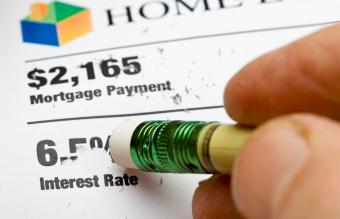
Wouldn't it be nice if a real estate loans came without the pain of mortgage payments? Unfortunately, life doesn't work that way.
Mortgage Payment Distribution
Use LoveToKnow's calculator to get an idea of your monthly mortgage payment based on your loan amount.
The most basic mortgage payment is made up of two components: principal and interest. During the first months of your mortgage, only a small portion actually goes toward paying off the loan balance. The majority of the payment will be applied against interest charges. For example, if you borrowed $100,000 for 30 years at 7 percent interest, you might see your first two years worth of payments applied as followed:
| Pmt # | Principal | Interest | Cumulative Principal | Cumulative Interest | Principal Balance |
| 1 | 81.97 | 583.33 | 81.97 | 583.33 | 99,918.03 |
| 2 | 82.44 | 582.86 | 164.41 | 1,166.19 | 99,835.59 |
| 3 | 82.93 | 582.37 | 247.34 | 1,748.56 | 99,752.66 |
| 4 | 83.41 | 581.89 | 330.75 | 2,330.45 | 99,669.25 |
| 5 | 83.90 | 581.40 | 414.65 | 2,911.85 | 99,585.35 |
| 6 | 84.39 | 580.91 | 499.04 | 3,492.76 | 99,5 00.96 |
| 7 | 84.88 | 580.42 | 583.92 | 4,073.18 | 99,416.08 |
| 8 | 85.37 | 579.93 | 669.29 | 4,653.11 | 99,330.71 |
| 9 | 85.87 | 579.43 | 755.16 | 5,232.54 | 99,244.84 |
| 10 | 86.37 | 578.93 | 841.53 | 5,811.47 | 99,158.47 |
| 11 | 86.88 | 578.42 | 928.41 | 6,389.89 | 99,071.59 |
| 12 | 87.38 | 577.92 | 1,015.79 | 6,967.81 | 98,984.21 |
| 13 | 87.89 | 577.41 | 1,103.68 | 7,545.22 | 98,896.32 |
| 14 | 88.40 | 576.90 | 1,192.08 | 8,122.12 | 98,807.92 |
| 15 | 88.92 | 576.38 | 1,281.00 | 8,698.50 | 98,719.00 |
| 16 | 89.44 | 575.86 | 1,370.44 | 9,274.36 | 98,629.56 |
| 17 | 89.96 | 575.34 | 1,460.40 | 9,849.70 | 98,539.60 |
| 18 | 90.49 | 574.81 | 1,550.89 | 10,424.51 | 98,449.11 |
| 19 | 91.01 | 574.29 | 1,641.90 | 10,998.80 | 98,358.10 |
| 20 | 91.54 | 573.76 | 1,733.44 | 11,572.56 | 98,266.56 |
| 21 | 92.08 | 573.22 | 1,825.52 | 12,145.78 | 98,174.48 |
| 22 | 92.62 | 572.68 | 1,918.14 | 12,718.46 | 98,081.86 |
| 23 | 93.16 | 572.14 | 2,011.30 | 13,290.60 | 97,988.70 |
| 24 | 93.70 | 571.60 | 2,105.00 | 13,862.20 | 97,895.00 |
Payment Additions
Your payment may actually cover more than just principal and interest. Depending on the terms of your loan documents, you may also need to pay the following:
Escrow
It is common for Mortgage Lenders to require you to pay escrow on a monthly basis. Escrow is typically made up of home owner insurance premiums and real estate property taxes. The lender accrues your premiums and taxes, then pays them directly to the insurance company and county treasurer.
Mortgage Insurance
Mortgage Insurance, also known as private mortgage insurance (PMI), is built into your monthly mortgage payments. Depending on certain factors, like the type of mortgage you obtain, the amount of down payment applied toward the property purchase, and your credit rating, the lender may require a separate insurance premium to apply against a policy. In the even you default on your loan, the lender can make a claim against the policy, thereby ensuring they will not lose their investment in your home. Normally, the premiums for PMI end as soon as you have paid on time for a specific number of months or when you have paid your loan down to less than 78 percent of the value of your home.
Late Fees
If you are late in paying your lender, you may find your loan balance actually increases rather than decreases, especially during the early months of your mortgage when so little of your mortgage payment is actually applied to the principal balance. The late fees may include not only a flat fee charge, but also the accumulation of interest on the amount of your normal principal payment during the time of your delinquency.
Mortgage Payment History Affect on Credit Rating
Since your mortgage is a long-term credit agreement, how you manage your payments can improve or destroy your credit rating. Delinquency can lead to the interest rate you pay on your next home or the refinance or second mortgage on your existing home fluctuating greatly from what you now pay.
Conversely, if you manage to remain current on your payments, you can increase your credit score. Improving your credit score can lead to receiving a much more favorable interest rate terms when you go to refinance your home, which can mean:
- Lower monthly payments
- More of your mortgage payments being applied toward the principal balance earlier in the loan
Additionally, if you decide to buy a new home, your equity in your existing home combined with your improved credit rating may qualify you for a mortgage on a large, more expensive property.
Early Pay Off
If your loan documents do not charge a fee for paying off your mortgage early, you can significantly reduce the amount of interest your pay over the life of the loan by doing any of the following:
- Instead of paying one payment a month, divide your payment in half and pay bi-monthly, ensuring that the full amount of month's balance due is paid by the due date.
- Pay more than the minimum amount due, and specifying additional payment amount is to be applied against the principal and not against future payment.
- Make an extra mortgage payment each year.
This also serves to increase the amount of equity you have in your home more quickly, which increases your net worth and gives you more options in the event you find yourself cash poor.
Conclusion
By responsibly handling your mortgage payments, you can significantly improve your financial health.







